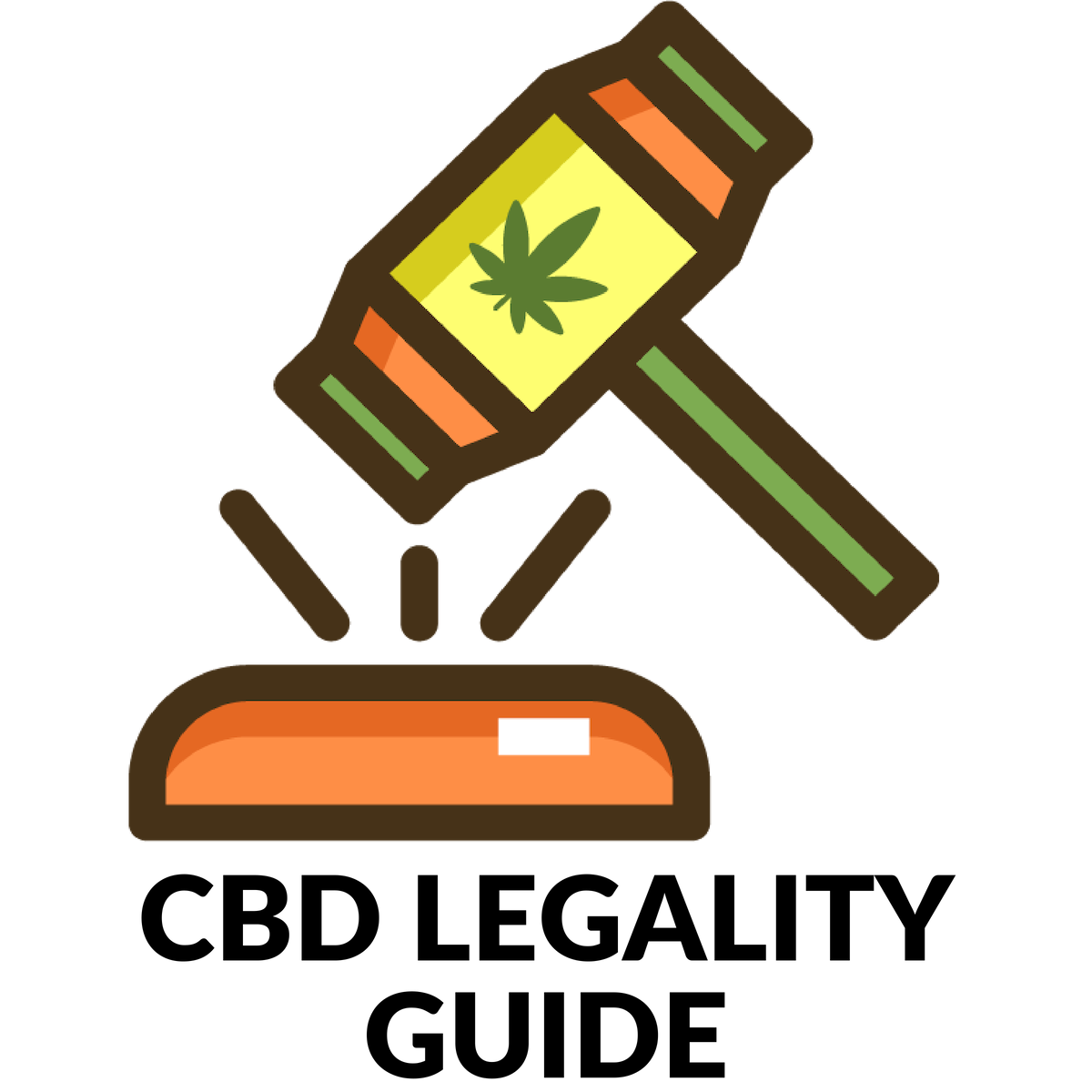
It’s the reason you clicked on this link. So let’s jump right to it. Is CBD — short for cannabidiol — legal?
Mostly, but it depends on who you talk to and where you are.
In broad strokes, CBD has been increasingly validated by peer-reviewed studies as a great option for those suffering from addiction, pain management, ADHD, strokes, and many other conditions. The Food and Drug Administration (FDA) has approved a CBD pharmaceutical for seizure treatment and classified it as a schedule 5 drug (the lowest chance of dependency and abuse).
From a legal perspective, one of the most critical distinctions for determining whether CBD is legal at the federal level is whether it was derived from hemp or marijuana.
Hemp and marijuana are both members of the cannabis genus of plants. These two plants share many characteristics, but vary on one very central point. While hemp contains nearly non-existent levels of tetrahydrocannabinol (THC)– generally up to .3% of hemp is THC — marijuana contains much higher levels (up to 30% THC).
THC is intoxicating compound that can produce mind-altering effects, and the primary reason why marijuana has long been classified as a schedule 1 substance by the Drug Enforcement Agency (DEA).
As of 2018, new federal legislation has removed hemp from its previous schedule 1 status and classified it as an “agricultural commodity.”
This doesn’t mean all CBD is legal according to federal laws. But CBD that meets certain standards and is derived from hemp is legal.
To stir up the pot even more, many states have created legislation ruling that CBD is fully legal, not legal at all, or legal under some conditions.
Needless to say, on paper the current legal status of CBD is convoluted.
In reality, it’s not quite as hard to follow. If you’re trying to discern whether CBD is legal for you or a family member in your own home, just be sure to consider the following:
- Whether your CBD is hemp or marijuana-derived
- The level of THC (if any) in you CBD
- Your state legislation on CBD
- Your state legislation on marijuana
- Federal legislation on CBD
Before we dive into the specifics of the legality of CBD in each and every state. Let’s take a look at rulings that theoretically affect anyone nationwide using or selling CBD.
Is CBD Legal According to Federal Law?
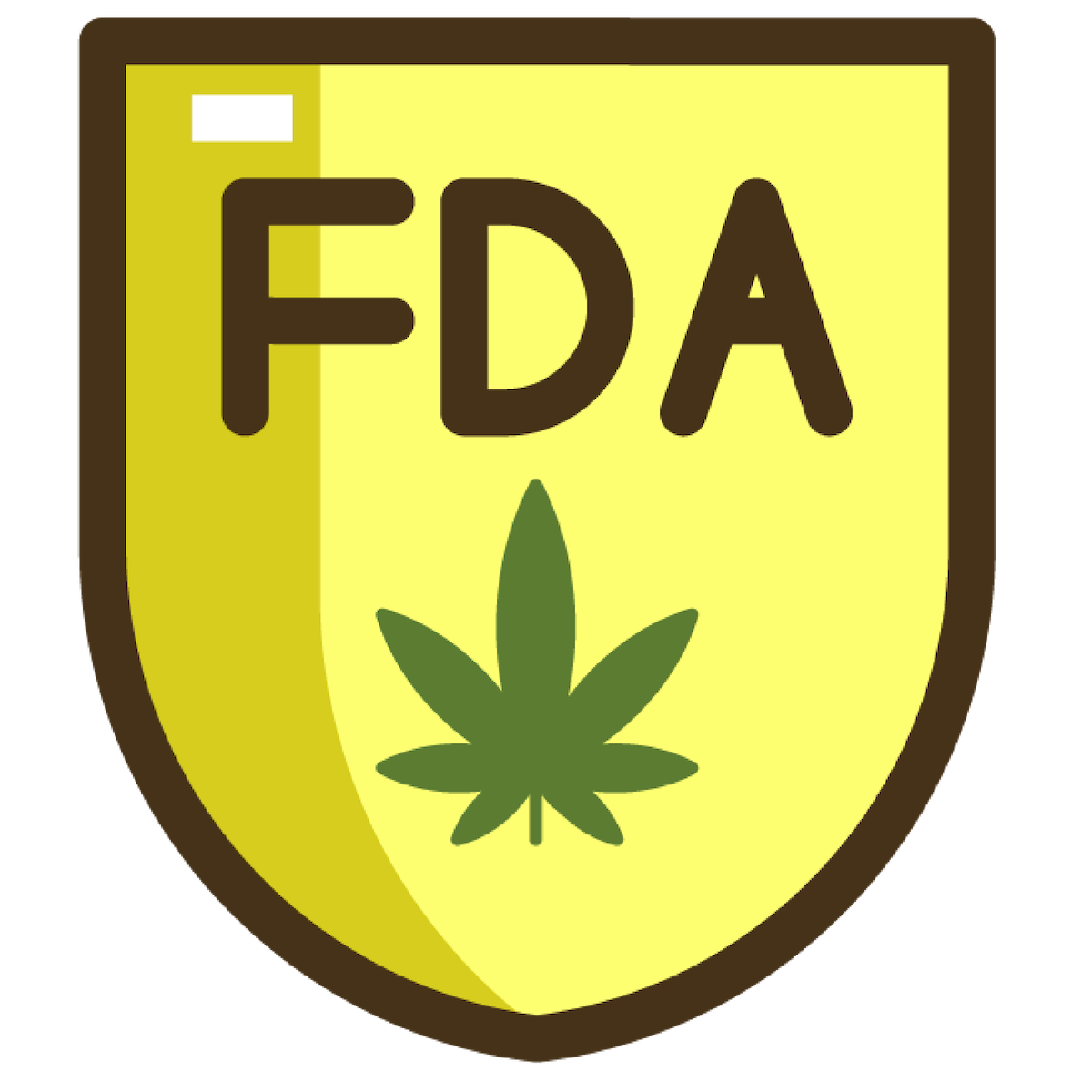
At the Federal level there are three primary rulings as to the legality of CBD. You’ll hear lawmakers, CBD producers, and CBD users cite the following to argue their own points.
In practice there has been close to no Federal action to penalize CBD producers or users. And few incidents with local law enforcement except for in a handful of the most hostile locales to CBD use (3 states).
With that said, there are federal regulations and legislation that comment on CBD.
The first ruling is based on the 1970 Controlled Substances Act, which mandates that the Drug Enforcement Agency place the THC-containing plant cannabis on schedule 1 for drug enforcement (DEA). Schedule 1 drugs are those deemed to have the highest potential for abuse and dependency.
Until mid 2018, the DEA technically applied this rule to all consumable products made from cannabis. In practice, the DEA has not undertaken public action to prosecute CBD producers or users.
In a 2017 quote from a DEA spokesperson it’s noted:
“They [CBD users] are not a priority for us… it would not be an appropriate use of federal resources to go after a mother because her child has epileptic seizures and has found something that can help and has helped.”
Technically, both hemp-derived and marijuana-derived CBD were deemed schedule 1 drugs until June of 2018. So what changed?
The 2018 Farm Act — signed by President Donald Trump — removed hemp-derived CBD from its schedule 1 status, and classified hemp derivatives as “agricultural commodities.”
Furthermore, The Hemp Farming Act from later that year cleared up any doubt about hemp-derived CBD. In this bill it defined hemp as all sections of the Cannabis Sativa plant that have equal to or less than .3% THC — by dry weight. This includes hemp derivatives, extracts, and — explicitly — cannabinoids.
While you’re likely in the clear either way. This is why it’s important to note whether your CBD is hemp-derived or marijuana-derived. Hemp-derived CBD meeting the criteria of the 2018 Farm Act and Hemp Farming Act is 100% Federally legal. Marijuana-derived CBD is technically classified as a schedule 1 drug by the DEA.
Oftentimes the simplest way to determine which type of CBD you have is to look at the THC content. Below .3% and it’s either an isolate that removed THC or hemp-derived. Above 3% and it’s likely marijuana-derived.
The third federal ruling on the legality of CBD comes from the Food and Drug Administration (FDA). In June of 2018 the FDA approved the first pharmaceutical containing CBD. Epidiolex was approved for the treatment of two pediatric seizure disorders. In doing so the FDA established a precedent in which this drug and future CBD-based drugs with less than .1% THC would be classified as schedule 5 narcotics (the least potential for abuse and dependency).
Though not pertinent to the legality of CBD for consumers, the FDA has another statement on CBD that was released several days after the 2018 Farm Act that legalized hemp-derived CBD. In this statement the FDA noted that any herbal supplement or product marketed to have therapeutic benefits containing CBD is illegal unless the FDA has reviewed and approved it. This is more of a note for CBD producers, and what types of claims they can make. But this statement also provides more federal guidance on the legality of new CBD products.
As with many new products, it takes time for Federal legislation to catch up and properly classify goods. The status of CBD is in some ways similar to its more controversial cousin marijuana. While states have legalized both CBD and marijuana, segments of both have remained illegal federally. In practice, state rulings on both marijuana and CBD have not been overturned by differing federal laws though they could be.
A State-By-State Guide To CBD Legality

As we’ve mentioned above, the 2018 Farm Bill led to the legal seperation of hemp (with less than .3% THC) and products made from other portions of the cannabis plant (with greater than .3% THC).
To varying degrees, state laws have caught up (or had pre-empted) the 2018 Farm Bill. For states that specifically allow even greater access to CBD products than prescribed in the Farm Bill, you’re generally in the clear. Presidential Memos to the DEA as well as statements from the DEA itself have declared marijuana arrests in states where it is legal to be a non-priority. Similarly, the DEA has stated they have no plans to prosecute CBD consumers anywhere in the nation.
For states with more restrictive CBD laws, these laws primarily apply to CBD producers. A handful of states allow CBD in some form, though provide restrictions on where CBD can be purchased within the state. States do have the right to regulate the sale of products created in their own state. But when CBD is produced in another state and
A few trends across states include:
- In states where recreational marijuana is legal:
- Non-medical use of marijuana-derived CBD is legal at the state level and illegal federally.
- Non-medical use of hemp-derived CBD is legal at the state and federal levels.
- In states where medical marijuana is legal:
- Medical use of marijuana-derived CBD is legal at the state and federally illegal.
- Medical use of hemp-derived CBD is legal at the state and federal levels.
- Non-medical use of hemp-derived CBD is legal federally and may or may not be legal at the state level.
- In states where no form of marijuana is legal:
- Many states have passed legislation specifically legalizing hemp-derived CBD.
- The most restrictive states have passed laws legalizing hemp-derived CBD only for positive defenses in court for those with certain medical conditions.
Deciphering state-level CBD laws:
- Many states have initiated laws to attempt to regulate hemp-derived CBD production in an effort to protect consumers. Once products are sold over state lines, however, the FDA regulates the sales and quality of the product.
- Most states with inhibitory hemp-derived CBD laws apply primarily to producers of CBD products.
- Since 2018, Federal law has declared hemp-derived CBD with less than .3% CBD legal. This doesn’t mean that a state with contrary views may not try to enforce local laws. However in court you will have legal grounds to challenge state enforcement. And federal laws do trump state laws.
Below we’re going to work through all of the states in the union (plus D.C.) to provide the latest legal status or both marijuana-derived and hemp-derived CBD. If there’s an asterisk in a state graphic, be sure to read the underlying text.
While many states have created legislation that deals explicitly with CBD, some have dealt with CBD through their state-level marijuana laws. Generally speaking, a state’s stance on recreational or medical marijuana also applies to recreational or medical marijuana-derived CBD. Most states have separate legislation regarding hemp-derived CBD.
Legend
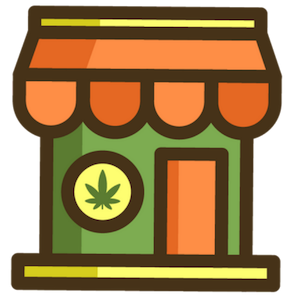
Recreational Marijuana

Medical Marijuana
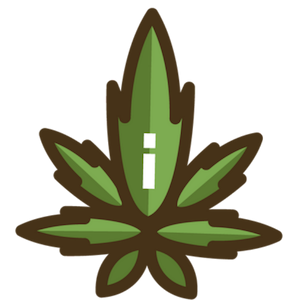
Marijuana-Derived CBD

Hemp-Derived CBD
Is CBD Legal In Alabama?
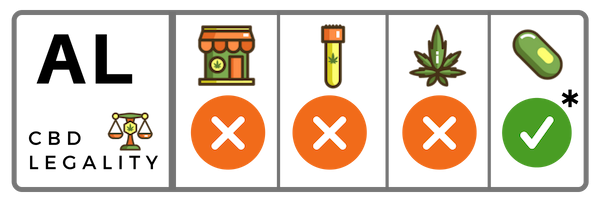
Alabama has some of the most restrictive marijuana laws in the nation. Though recently a decriminalization of marijuana act has started to push through state congress. For now, Alabama’s marijuana laws apply to marijuana-derived CBD (which is illegal in all circumstances). Hemp-derived CBD with less than .3% THC (the definition of hemp) is legal for those suffering from debilitating illnesses or the parents of those suffering from debilitating illnesses. Debilitating illnesses are specified as certain seizure disorders in the law. It’s explicitly noted that children may not be taken from parents for possession of CBD.
Click here for more information on CBD in Alabama.
Is CBD Legal In Alaska?

Cannabis has been decriminalized in Alaska since 1975. As of 2014, recreational marijuana was legalized meaning that cannabis products with all levels of THC are legal, including recreational marijuana, medical marijuana, marijuana-derived CBD, and hemp-derived CBD. As of 2018, Alaska has had a specific law in place to explicitly allow the industrial growing of hemp in the state. The budding hemp growing industry there will be governed by the department of agriculture instead of the department of alcohol and marijuana.
Click here for more information on CBD in Alaska.
Is CBD Legal In Arizona?
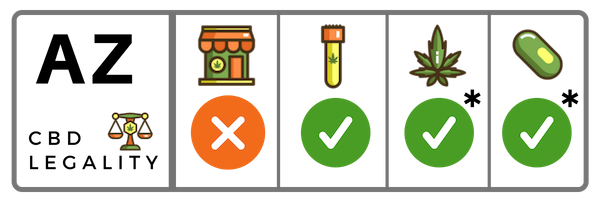
Arizona has had medical marijuana laws in place since 2010 and a number of state-approved dispensaries provide medical weed. The state is currently examining a number of further legislative proposals related to marijuana, but for now weed is not decriminalized. This means that to be in possession of marijuana or marijuana-derived CBD you must have a “green” card. In May 2018, a pilot program bill passed allowing approved and licensed industrial hemp growers to begin operations. This means that hemp-derived CBD is also legal for consumers in the state provided that it has THC in volumes less than .3% and no portion of the CBD was derived from a portion of the cannabis plant with more than .3% THC.
Click here for more information on CBD in Arizona.
Is CBD Legal In Arkansas?

As of late 2017, medical marijuana was approved for 17 medical conditions in Arkansas. This legalization also applied to marijuana-derived CBD, which is strictly legal for those obtaining it through the state’s medical weed program. Marijuana has not been decriminalized in the state, though the towns of Eureka Springs and Fayetteville have voted to make weed arrests one of the lowest priorities for their police departments. Since 2017 an industrial hemp pilot program has been available in the Natural State, and as such hemp-derived CBD (with less than .3% THC) is fully legal at the state level.
Click here for more information on CBD in Arkansas.
Is CBD Legal In California?

California has been at the forefront of attempting to legalize weed for decades. In 1972 the state’s first (failed) ballot initiative attempted to legalize. In 1996, medical marijuana was legalized (as well as marijuana-derived CBD for medical patients). And in 2016 the state became one of the first to legalize recreational marijuana. Surprisingly industrial hemp production is somewhat complicated legally in California. Though it has been cultivated since the 1700’s in the territory that became the state. California has not explicitly noted a stance on hemp-derived CBD, though all other forms of cannabis products are legal in the state,and CBD products are routinely sold across the state.
Click here for more information on CBD in California.
Is CBD Legal In Colorado?

Perhaps unsurprisingly, Colorado has perhaps the most forward thinking laws regarding marijuana and CBD. Medical marijuana has been legal in Colorado since 2000. With recreational marijuana gaining legality in 2012. As is the case with all the other states we have examined, this applies recreational marijuana laws to marijuana-derived CBD. In Colorado, industrial hemp is governed under a pilot program run by the department of agriculture. Marijuana, meanwhile is governed by the department of revenue. Colorado is one of ten states in which all four categories of CBD and marijuana are fully legal according to state law.
Click here for more information on CBD in Colorado.
Is CBD Legal In Connecticut?

Connecticut has had a functioning medical marijuana law since 2012. Patients with a wide range of qualifying conditions are allowed up to a full-month supply as prescribed by a Connecticut licensed doctor and bought from a state-approved dispensary. No growing rights are offered to medical marijuana patients. Some doctors may elect to prescribe marijuana-derived CBD instead, which may also be bought at medical dispensaries. As of March of 2019 a pilot hemp growing program has started to advance through state legislature after interest from more than 6,000 farmers was expressed.
Click here for more information on CBD in Connecticut.
Is CBD Legal In Delaware?

Since 2011, Delaware has had a functioning state medical marijuana law. The law allows qualifying patients that have been prescribed THC by a Delaware-licensed physician to hold up to six ounces of marijuana or marijuana-derived CBD. At this time no home growing allowances are made. Patients must by marijuana or marijuana-derived CBD from a licensed state dispensary. Since 2015, marijuana has been decriminalized in the state, and those found with small amounts of recreational marijuana will not have any charges placed on their permanent record. In 2018, a hemp cultivation pilor program passed state legislature allowing growers of hemp products in the state. It is presently legal to consume hemp-derived CBD in the state.
Click here for more information on CBD in Delaware.
Is CBD Legal In District of Columbia?

Washington DC is a unique addition to location in the US that have legalized recreational weed. Though recreational marijuana has been legal in DC since 2014. Up to 2 ounces is legal to carry, smoke, turn into an edible, or grow. The only thing is that it’s illegal to buy or sell weed. This has led to a unusual arrangement not seen anywhere else in the US where weed is often given as a “freebie” for some other form of purchase or donation. The transaction still occurs, just not directly. And for the purposes of the consumer, weed is legal to own and consume. As of the writing of this guide, the Mayor of DC had recently proposed plans to push for the legalization of buying and selling within the district. No hemp-specific legislation has been proposed in the city. Though as with other locations in which recreational marijuana has been legalized, you’re likely to be just fine.
Click here for more information on CBD in the District of Columbia.
Is CBD Legal In Florida?

Florida became one of the more recent states to enact medical marijuana legislation. In 2017, a compassionate care act was passed which allows patients with a wide range of medical issues to be prescribed marijuana and marijuana-derived CBD from licensed Florida doctors. Patients do not presently have the right to grow marijuana at home. And no doctor may prescribe more than 3 70-day marijuana supplies at any one time. In 2017 a hemp pilot program was initiated at certain state universities. After two years the option to expand this program into commercialization of hemp will begin. As of March, 2019, a bill legalizing hemp-derived CBD consumption passed in the state, bringing Florida inline with Federal laws.
Click here for more information on CBD in Florida.
Is CBD Legal In Georgia?

As far as marijuana and marijuana-derived CBD, Georgia is presently structuring their program. Technically medical marijuana is legal, and six firms have been granted license to sell THC-containing products within the state. The state, however, has not yet granted licenses for any dispensaries. Marijuana-derived CBD with up to 5% THC is technically legal for medical marijuana patients. But only a few licensed growers throughout the state are allowed to create this marijuana-based CBD, and it may be 2 years or more before it hits the shelves. In regards to hemp-derived CBD, a hemp-bill allowing the cultivation and sales of CBD was passed in early 2019.
Click here for more information on CBD in Georgia.
Is CBD Legal In Hawaii?

Hawaii initially legalized medical marijuana in 2000, but just recently offered licenses to dispensaries. The state offers medical marijuana to patients with a wide variety of conditions. This legalized status also extends to marijuana-derived CBD for those same patients. One unique allowance within Hawaii’s medical marijuana law is that they allow those with access to medical marijuana in other states to buy medical marijuana within their state. This allows people that rely on medical marijuana and marijuana-derived CBD for pain the ability to vacation in Hawaii without fear of running out of their medication. Hawaii enacted a hemp research pilot program in 2014 with a grow site at a state university. Hemp-derived CBD is legal to consume in the state.
Click here for more information on CBD in Hawaii.
Is CBD Legal In Idaho?

Idaho has some of the most restrictive CBD and marijuana-related laws in the nation. Not only is marijuana-derived CBD explicitly illegal in the state, but hemp-derived CBD must meet a series of strict conditions to be legal. First, hemp-derived CBD products sold in the state must verifiable be from one of five approved parts of the cannabis plant. This rules out isolates, which are derived from unapproved areas of the plant even though they contain 0% THC. The second condition focuses on THC level and mandates that CBD products consumed in the state must have 0% THC present. Unsurprisingly, medical and recreational marijuana are illegal in Idaho. And marijuana consumption are criminalized.
Click here for more information on CBD in Idaho.
Is CBD Legal In Illinois?

Currently Illinois is within a trial period for medical marijuana (that also legalizes marijuana-derived CBD for patients). Under a current proposal that isn’t yet passed, the medical marijuana program would become permanent and expand its offerings to patients with a wider range of conditions. Within the last year Illinois has passed an industrial hemp pilot program law, and is now accepting 30 growers. Hemp-derived CBD is legal to consume within Illinois.
Click here for more information on CBD in Illinois.
Is CBD Legal In Indiana?

Indiana is currently one of the more restrictive states in the union regarding marijuana and CBD. Marijuana is not legal recreationally or for medical reasons. Hemp-derived CBD is legal, but not for everyone. A recent law makes it legal for those suffering from specific seizure disorders to possess and consume CBD with less than .3% THC per weight (hemp-derived). Furthermore, all forms of marijuana are highly criminalized in Indiana.
Click here for more information on CBD in Indiana.
Is CBD Legal In Iowa?

Iowa has a functional medical marijuana as well as a medical CBD law. Both allow patients with the same list of conditions to partake in the program as long as they were prescribed a THC-containing treatment by a licensed Iowan doctor. The medical CBD law caps the THC amount in medical CBD at 3%, roughly 10 times higher than hemp-derived CBD, but substantially lower than medical marijuana. Iowa is in the process of passing an industrial hemp law which would allow registered growers as well as explicitly confirm the legality of hemp-derived CBD. Iowa has not decriminalized weed except for in medical circumstances.
Click here for more information on CBD in Iowa.
Is CBD Legal In Kansas?

Kansas is one of the tougher states in the union in which to get (state-level) legal CBD. Medical marijuana bills have been proposed and failed. Though a hemp-derived CBD law was passed in late 2018. This law allows individuals to buy, carry and consume CBD that contains no THC. No mechanism for buying CBD in a state approved way was proposed in the bill. Though technically a zero percent THC CBD oil ordered online and shipped to Kansas is legal. For all other THC levels, THC-containing CBD and marijuana are criminalized within the state.
Click here for more information on CBD in Kansas.
Is CBD Legal In Kentucky?

Kentucky has attempted to legalize medical marijuana, and will likely attempt legislation in the future, but thus far the legislation has failed. Hemp has historically been a popular crop in Kentucky, and attempts to legalize industrial hemp production began in 1994. SInce 2014, the state has relied on the Federal Farm Bill to provide guidance on hemp production, and by 2016 was one of the three largest producers of hemp in the nation. Farmers producing hemp in Kentucky must gain seeds from an organization licensed by the DEA or a state institution of higher education, and CBD produced must have less than .3% THC.
Click here for more information on CBD in Kentucky.
Is CBD Legal In Louisiana?

Louisiana has had legalized medical marijuana since 1978. In recent years with the emerging popularity of marijuana-derived CBD, this CBD derivation has also been legal for qualifying patients. A network of dispensaries has failed to arrive however. Though a more recent bill in 2015 has laid the groundwork for emerging dispensaries. While recreational marijuana is illegal, marijuana has been decriminalized in the state as well as in the specific cities of Baton Rouge and New Orleans. In 2015, Louisiana provided a legal method for taxation of hemp-derived CBD, effectively legalizing it. In 2019, the state passed a bill allowing industrial growers.
Click here for more information on CBD in Louisiana.
Is CBD Legal In Maine?

Maine is one of the most recent states to fully legalize marijuana (recreational and medicinal). In 2016 a bill was passed for recreational marijuana. But due to the governor’s opposition to recreational weed, the path towards recreational dispensaries has remained blocked. Maine does have a robust network of medicinal dispensaries. And for qualified “green card” holders marijuana and marijuana-derived CBD is available. But for now full recreational use is not being practiced. With this said, weed is fully decriminalized within the state. Hemp-derived CBD is fully legal. An industrial hemp grower law has been in place since 2009.
Click here for more information on CBD in Maine.
Is CBD Legal In Maryland?

Since 2014, weed has been decriminalized in Maryland. While recreational use is still illegal, a robust network of in-state medical dispensaries provide medical marijuana and medical marijuana-derived CBD. With this said, those that cannot prove medical need to use marijuana-derived products in court are faced with only a $100 fine, making Maryland one of the most highly decriminalized states short of those where recreational weed is legal. In early 2019, a bill allowing the growing, processing, selling, and buying of industrial hemp was passed. Hemp-derived CBD is fully legal in Maryland.
Click here for more information on CBD in Maryland.
Is CBD Legal In Massachusetts?

Massachusetts is one of the most recent states to fully legalize marijuana including medical and recreational use. This means that marijuana-derived and hemp-derived CBD are fully legal to all visitors within the state. This is all quite a new development for Massachusetts. With the first two recreational dispensaries opening in late 2018. Industrial hemp growing in the state is in line with the 2018 Farm Bill.
Click here for more information on CBD in Massachusetts.
Is CBD Legal In Michigan?

Michigan is one of the most recent states to legalize recreational marijuana, after several years of allowing medical marijuana. As of the writing of this article only one recreational dispensary license has been granted. But, it has only been three months since the passing of the recreational marijuana bill. This means that it’s likely that in the near future marijuana-derived CBD will both be legal for recreational use, but also readily available throughout the state. Industrial hemp cultivation also became legal with the late 2018 recreational legalization bill. As such, hemp-derived CBD is also legal.
Click here for more information on CBD in Michigan.
Is CBD Legal In Minnesota?

Minnesota currently offers medical marijuana for a wide range of conditions. This means that marijuana-derived CBD is also legal for qualifying patients. There are a few caveats, however. Most of the states’ medical dispensaries are clustered in a few areas. And a large portion of all medical marijuana patients had to go through a handful of doctors. With that said, comparing Minnesota to other medical marijuana destinations shows a well established program that is providing access to thousands of Minnesotans. 2016 was the first year for an industrial hemp pilot program within the state, and the program has since expanded quite a deal. WIth that said, the state is deferring to the 2018 Farm Bill to establish legality of CBD. This means that CBD derived from hemp is legal.
Click here for more information on CBD in Minnesota.
Is CBD Legal In Mississippi?

Mississippi has some of the strictists cannabis-related laws in the nation. All marijuana use — recreational or medical — is illegal. Though legislation is set to be voted on later this year. One of the most pro-cannabis laws in the state was instituted in 2014, and allows an affirmative defense in court for those with hemp-derived CBD and with a debilitating epileptic condition (of the guardian of one such person). This is to say that as of now — even though federally legal — all CBD products are illegal according to state law in the state of Mississippi except for for those with debilitating epileptic conditions.
Click here for more information on CBD in Mississippi.
Is CBD Legal In Missouri?
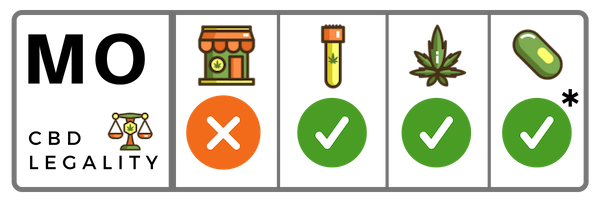
Missouri has recently implemented a medical marijuana law for a wide range of conditions. This law will allow those with documented qualifying conditions to be prescribed medical marijuana and marijuana-derived CBD products from licensed physicians in Missouri. Differently from other states just rolling out medical marijuana, Missouri has set a number of concrete deadlines in place for the roll out of the program. In 2018, an industrial hemp law was passed in the state, bringing the state into line with the 2018 Farm Bill and allowing growing, selling, and buying of hemp-derived CBD.
Click here for more information on CBD in Missouri.
Is CBD Legal In Montana?

Montana has had a medical marijuana law in place since 2004. Though the law was tightened somewhat in following years, it resumed a form similar to the original bill more recently. Industrial hemp was legalized in 2009 — quite early for bills specifically related to the matter. This means that marijuana-derived CBD is legal for medical marijuana patients within the state and hemp-derived CBD is generally legal.
Click here for more information on CBD in Montana.
Is CBD Legal In Nebraska?

Nebraska has some of the most restrictive marijuana laws in the nation. Recreational and medical marijuana are both illegal. With this said, the state has decriminalized marijuana possession to some degree, meaning first-time offenders do not face prison time. While hemp-derived CBD is federally legal according to the 2018 Farm Bill, the state of Nebraska is currently voting on whether to legalize hemp production within the state. The bill is expected to pass or fail by the early summer of 2019.
Click here for more information on CBD in Nebraska.
Is CBD Legal In Nevada?

Nevada is one of the most recent states to fully legalize marijuana. In 2000 the state rolled out medical marijuana. With decriminalization of recreational marijuana following in 2001. In 2017, the state voted to legalize recreational marijuana. Dispensaries are now available throughout the state. Individuals are banned from growing their own marijuana unless they live more than 25 miles from the nearest dispensary. This means that marijuana-derived CBD is legal to all citizens and visitors to the state. Industrial hemp growing is also legal in the state.
Click here for more information on CBD in Nevada.
Is CBD Legal In New Hampshire?

New Hampshire legalized medical marijuana back in 2013, which correspondingly legalized marijuana-derived CBD for medical patients with a number of qualifying conditions. In 2017 the state decriminalized marijuana, though it is still not legal recreationally. Up to a fourth marijuana possession offense carrying low amount of cannabis just leads to a small fine. Since 2015 an industrial hemp growing law has been in place authorizing the University of New Hampshire to grow and research industrial hemp. Other growers are not currently accepted into the program. For consumption, however, hemp-derived CBD is legal.
Click here for more information on CBD in New Hampshire.
Is CBD Legal In New Jersey?

New Jersey legalized the use of medical marijuana in 2010, and has a wide range of dispensaries as well as dispensaries in neighboring states. This means that those with qualifying medical conditions and New Jersey “Green Cards” can legally imbibe marijuana-derived CBD products as well. Presently the recreational legalization of weed is heading to the New Jersey legislature within the coming months. As of 2018, the state passed an industrial hemp bill establishing the basic framework for hemp farming within the state. This program is presently in the pilot program stage. Hemp-derived CBD products are presently legal in New Jersey.
Click here for more information on CBD in New Jersey.
Is CBD Legal In New Mexico?

New Mexico legalized medical marijuana in conjunction with medical research programs as early as 1978, making NM the first state to partially legalize medical marijuana. In 2017, the state fully legalized medical marijuana for a wide range of conditions. This means that marijuana-derived CBD is also legal for New Mexico residents with “green cards.” An industrial hemp law will take effect in July of 2019, allowing the cultivation and processing of hemp to make textiles and CBD. Hemp-derived CBD products are legal in New Mexico.
Click here for more information on CBD in New Mexico.
Is CBD Legal In New York?

New York is in the process of looking into legalizing recreational marijuana. Though political gridlock still bedevils the issue. Counties have opted out, and the state has not proposed a taxation structure. With this said, in 2018 marked a call from the governor to investigate what legalizing weed would do for the state. The governor stated the legalization of weed would be included in the 2019 state budget. Presently medical marijuana is legal and dispensaries are placed throughout the state. Marijuana is decriminalized, and hemp-derived CBD is presently legal.
Click here for more information on CBD in New York.
Is CBD Legal In North Carolina?

North Carolina has some of the more restrictive marijuana laws in the nation. Medical marijuana bills have been introduced in the state, though have been voted down. In 2015, the governor did sign a law legalizing CBD with between .3% and .9% THC (marijuana-derived) CBD for those with intractable epilepsy. There is presently no mechanism through which these patients can purchase such products, though. In 2015, a hemp bill was passed allowing growers entered into their pilot program to cultivate industrial hemp. Hemp-derived CBD is legal in the state.
Click here for more information on CBD in North Carolina.
Is CBD Legal In North Dakota?

North Dakota voters rejected a bill to legalize recreational marijuana in late 2018 in a popular referendum. Medical marijuana has been available for a wide variety of conditions since 2016. As such, marijuana-derived CBD products are also available to “green card” holders. North Dakota has legalized hemp growing, though has interpreted the 2018 Farm Bill to not take affect with guidance on growing hemp until 2020. Thus, North Dakota follows the 2014 Farm Bill for guidance on hemp cultivation and sales. Hemp-derived CBD is legal in North Dakota.
Click here for more information on CBD in North Dakota.
Is CBD Legal In Ohio?

Recreational marijuana is illegal in Ohio, though has been highly decriminalized. In 2016, the state legalized medical marijuana for a range of conditions. This means that for qualifying patients, marijuana-derived CBD is also legal. The first sales under this law were reported in January, 2019. As of March, 2019, a bill legalizing the cultivation of industrial hemp as well as the sales and use of hemp-derived CBD products was passed.
Click here for more information on CBD in Ohio.
Is CBD Legal In Oklahoma?

A popular vote referendum for medical marijuana passed in Oklahoma in 2018. Though the state is in the process of sorting out details, this means that medical marijuana and marijuana-derived CBD are legal in the state of Oklahoma. Hemp-derived CBD products have been popular in the state for close to a decade, and the state passed a bill explicitly legalizing hemp-derived CBD in 2015. Modest decriminalization of weed has also occurred in Oklahoma.
Click here for more information on CBD in Oklahoma.
Is CBD Legal In Oregon?

Oregon is one of ten states in the Union to have fully legalized all forms of weed. Marijuana has been decriminalized in Oregon since 1997, and in 2014 fully legalized recreational marijuana. A wide range of dispensaries are available across the state and individuals may grow their own plants as well. This means that both forms of CBD (marijuana-derived and hemp-derived) are fully legal in Oregon.
Click here for more information on CBD in Oregon.
Is CBD Legal In Pennsylvania?

Medical marijuana use was legalized in 2016 in Pennsylvania, and thus marijuana-derived CBD is legal for qualifying medical patients also. Though recreational use is illegal in Penn, many of the largest cities have greatly decriminalized use. A multi-month “listening tour” by the governor in 2018 led to many events in which the public can share their perspectives with the executive branch of the state regarding recreational marijuana. Pennsylvania legalized the licensed growing of industrial hemp in 2016. Hemp-derived CBD is legal in the state.
Click here for more information on CBD in Pennsylvania.
Is CBD Legal In Rhode Island?

Rhode Island has witnessed multiple legislative attempts to legalize recreational marijuana, all of which have failed. The state was one of the earliest states to legalize recreational marijuana, however (2006). In 2009, the state became the second in the nation to implement a dispensary system (behind California). Marijuana-derived CBD is available for patients with qualifying conditions through a licensed dispensary. In 2016, the state passed a hemp law regulating the cultivation and sales of hemp. Hemp-derived CBD is legal in Rhode Island.
Click here for more information on CBD in Rhode Island.
Is CBD Legal In South Carolina?

Historically South Carolina has some of the most restrictive marijuana laws in the nation. Marijuana possession has not been decriminalized, and recreational and medical marijuana are illegal. In 2014, the state did sign a bill allowing hemp-derived CBD, but only for disabling epileptic conditions and at the request of a doctor. With all that said, there is presently a bill that could proceed to a vote on medical marijuana in South Carolina.
Click here for more information on CBD in South Carolina.
Is CBD Legal In South Dakota?

South Dakota has highly prohibited marijuana laws. Additionally, South Dakota is the only state in the union that criminales the ingestion of controlled substances. Those not authorized to imbibe controlled substances can be charged if they test positive for cannabis consumption. Medical cannabis bills have been proposed and voted down several times in the state. Additionally, petitions have circulated to bring the matter to a vote. As of March, 2019 a bill legalizing hemp-derived CBD was passed. The bill was vetoed by the governor but subsequently the veto was overruled.
Click here for more information on CBD in South Dakota.
Is CBD Legal In Tennessee?

Tennessee has viewed medical marijuana as legal for a set range of conditions since 2015. There are no dispensaries in the state, so patients have had to acquire marijuana-related medicines through pharmacies or in other states. The same rules apply to marijuana-derived CBD. A number of municipalities have decriminalized marijuana.The state has passed an industrial hemp law, and is one of the largest growers of industrial hemp in the nation (top 3). Hemp-derived CBD is legal for consumption in TN.
Click here for more information on CBD in Tennessee.
Is CBD Legal In Texas?
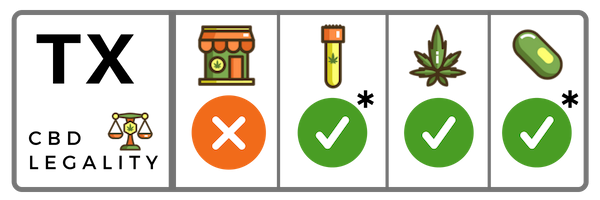
Texas has historically been quite harsh with marijuana laws. Recently, low-THC marijuana products have been approved for medicinal use for epilepsy patients that are prescribed the substance. Currently there are multiple piece of legislation being passed through the legislature regarding expanding medical marijuana. Bills related to the cultivation of hemp have been pre-filed in the state legislature and are pending votes. Though hemp-derived CBD is legal federally, not all local prosecutors in Texas have been able to agree on how to proceed locally. As of the writing of this article, several bills related to medical marijuana and hemp are proceeding through the legislature.
Click here for more information on CBD in Texas.
Is CBD Legal In Utah?

Utah legalized the medical use of marijuana — and thus marijuana-derived CBD — in late 2018 for a range of medical conditions. Generally, marijuana is not decriminalized in Utah. The state has passed a CBD-only bill as early as 2014, however. And pilot growing programs for hemp agriculture have passed the legislature. As with many states in the process of examining medical marijuana expansion, marijuana-derived CBD is legal for medical marijauana patients, and hemp-derived CBD is legal generally.
Click here for more information on CBD in Utah.
Is CBD Legal In Vermont?

As of July 2018, Vermont became one of the latest states to legalize recreational marijuana. The state had legalized medical marijuana as early as 2004. There are currently no recreational dispensaries. Though work is in progress to lay the groundwork for these to open their doors. Once this process is complete both marijuana-derived and hemp-derived CBD will be fully available to citizens and visitors of Vermont.
Click here for more information on CBD in Vermont.
Is CBD Legal In Virginia?

Virginia has some of the more restrictive marijuana laws in the country. Marijuana has not been decriminalized state wide. A bill did pass in 2015 allowing for patients with severe epilepsy to have a positive defense in court for the ownership or use of hemp-derived CBD if their doctor recommends it. An additional bill allows the use of marijuana products with up to 10mg of THC present.
Click here for more information on CBD in Virginia.
Is CBD Legal In Washington?

Washington was one of the earliest states to officially legalize marijuana for recreational use. Since 1979, the state has found possession of marijuana for medical purposes legally defensible. Through the 2000’s a wide range of undocumented medical marijuana dispensaries were found across the state. Though through this time period Federal interference shut down many of these operations. In 2013 recreational marijuana, and htus marijuana-derived CBD and hemp-derived CBD were made legal to all citizens and visitors in Washington. Later that year, Federal agencies announced they would not interfere with state-level legalization.
Click here for more information on CBD in Washington.
Is CBD Legal In West Virginia?

Medical marijuana has been legal in West Virginia since 2017, though recreational use or possession has not been decriminalized. This means that for qualifying patients, marijuana-derived CBD is legal within the state. Last year an industrial hemp bill was passed, and recently the first wave of applicants to grow industrial hemp have been issued within the state. CBD-derived hemp is legal in West Virginia.
Click here for more information on CBD in West Virginia.
Is CBD Legal In Wisconsin?

Wisconsin has some of the more restrictive marijuana laws in the nation. All forms of marijuana are currently criminalized in the state. Though the current Governor has outlined a plan for decriminalization. Hemp-derived CBD is legal for medical patients with debilitating epilepsy and whose doctor recommends CBD. A pilot program for hemp cultivation has been in effect since the 2014 Farm Bill.
Click here for more information on CBD in Wisconsin.
Is CBD Legal In Wyoming?

Wyoming has some of the most severe marijuana laws in the nation. All forms of marijuana are criminalized in the state. And through 2018 the state legislature voted on bills to increase penalties for possession. A bill is slated to head to legislature for the legalization of medical marijuana and marijuana-derived CBD, though this has not yet occured. A Wyoming hemp bill has recently passed, however, that enables growers to move forward as well as legalizes possession of hemp-derived CBD.
Click here for more information on CBD in Wyoming.
Disclaimer: This guide is not meant to act as a substitute for professional legal advice. Rather this is a collection of publicly available information on the legality of marijuana and CBD. Laws and regulations on the topic are changing quickly. When in doubt search for applicable Federal laws, laws within your state, or obtain professional legal advice.
